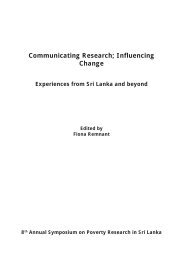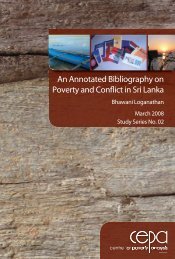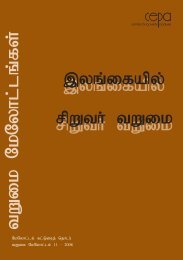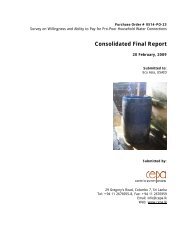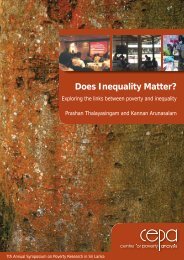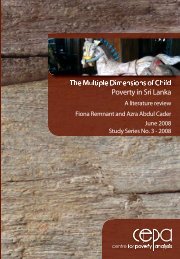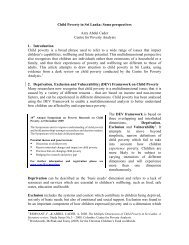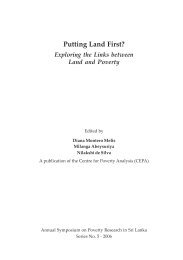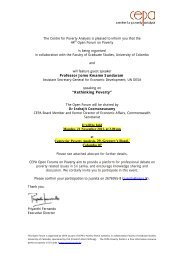Involuntary Displacement and Resettlement â Policy and ... - CEPA
Involuntary Displacement and Resettlement â Policy and ... - CEPA
Involuntary Displacement and Resettlement â Policy and ... - CEPA
- No tags were found...
You also want an ePaper? Increase the reach of your titles
YUMPU automatically turns print PDFs into web optimized ePapers that Google loves.
nuclear family established through a monogamous marriage (Goonesekera1990: 157). A non-marital cohabitating couple is not a legal family <strong>and</strong> is notrecognised “by the Sri Lanka law on family relations” (ibid: 159), even ifcohabitation itself is socially recognised <strong>and</strong> generally accepted (179). A GNwould know about long st<strong>and</strong>ing co-habitating arrangements in his/her area,could take this into consideration <strong>and</strong> award compensation to a non-maritalcohabitating couple if s/he wished. However, the GN is not legally obliged todo so. Unless the GN or the Divisional Secretary (DS) acknowledged suchunions, many families living in a cohabitation arrangement at the time of thetsunami were left behind. In referring to married couples only, the policy setsa context where a single woman, even a woman who was once married, canbe ignored. Such is the case of Sita, a widow:I went to the GN <strong>and</strong> the DS office so many times. First they said to me,“You are alone you don’t need a house.” Another time they said, “go backto where you were born <strong>and</strong> get a deed for a piece of l<strong>and</strong> that you can buyfrom there.(Field notes, 26 October 2007)Sita is a Tamil of Indian origin who was born in the Ratnapura District. She isalone; her children have grown up <strong>and</strong> moved away. She was living in Dehiwalaat the time of the tsunami. Her ability to obtain compensation <strong>and</strong> the respect oflocal government authorities appears to be inflected by her social position as asingle woman, living alone without sons or other male relatives to help her,compounded by her ethnic minority status that classifies her as a Colombo‘outsider’ (“go buy l<strong>and</strong> in the place that you are from”).Receiving a permanent house is not automatically guaranteed to a marriedwoman either, especially if the new house is titled solely in the husb<strong>and</strong>’sname. This is Mrs. Swarnadurai’s situation. When a new house in adonor-driven scheme was given to her family, the house was written only inher husb<strong>and</strong>’s name. He ab<strong>and</strong>oned the family, claimed the title, <strong>and</strong> nowlives in the new house with another woman. Even though their home wasreplaced under the house-to-house rule, which does not entitle her family toanything else, she managed 13to obtain Rs. 500,000 <strong>and</strong> bought a piece of13According to the Section 2.3.4 of the Housing <strong>Policy</strong>, District Secretaries were requested toprioritise single women <strong>and</strong> the elderly. Under Section 6, District Secretaries were given discretionarypowers for ‘special cases’ (COHRE 2006: 6). Therefore even though her house had beenreplaced, once her husb<strong>and</strong> left her <strong>and</strong> took the house, Mrs. Swarnadurai suddenly foundherself in a new social/subject position that quite possibly made her eligible for ‘another’ house.187



